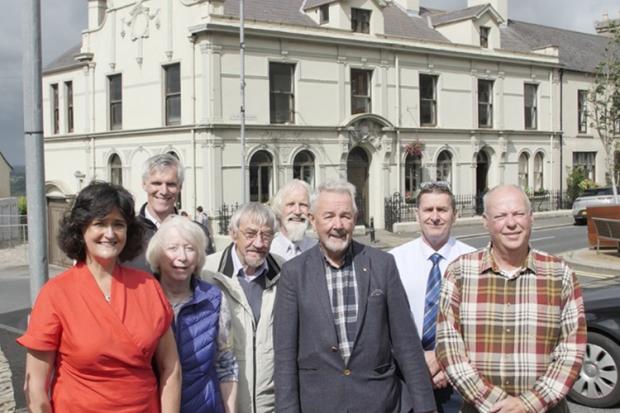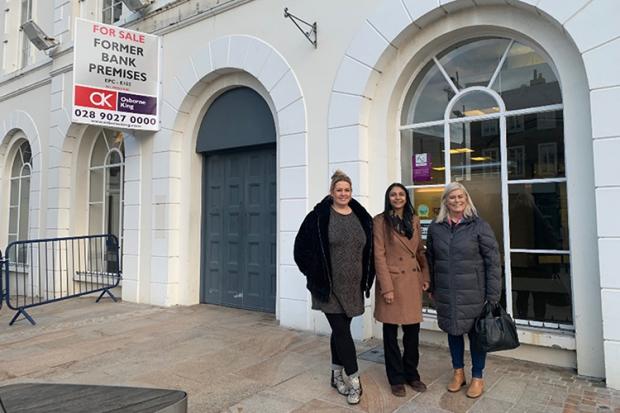Preventative maintenance
‘A stitch in times saves nine’ – for advice on how to maintain heritage assets and avoid the need for repairs, please see our advice pages for listed buildings maintenance and care of monuments.
Historic Environment Fund
Repair, Regeneration, Repair and Revival
The Department’s principal means of providing support to you, if your heritage assets need repair or if you want to develop an idea to realise the wider value of our heritage, is through our Historic Environment Fund (HEF). This is divided into four streams: Research, Repair, Regeneration and Revival. Subject to confirmation of budgets, it is normally launched in May each year. Most streams are only open to applications for a limited time. We can only support expenditure carried out by 31 March. If you would like us to e-mail you when the streams are launched, please send your details to historicenvironmentfund@communities-ni.gov.uk.
The Roof and Window Repair stream
The Roof and Window Repair stream is currently closed to applications.
Over the last three years we have focused our repair budget on essential work to roofs and windows. Though this is open to all listed buildings, our budget has been oversubscribed and we have had to focus support on our three priority categories: buildings on the Heritage at Risk Register; thatched buildings; and buildings with owners on eligible benefits
The Regeneration stream

This is a strategic part of the Fund mainly focused on supporting partners such as: Ulster Architectural Heritage, the Architectural Heritage Fund, and the National Churches Trust to develop projects to tackle Heritage at Risk and problems faced by historic churches.
The Scheduled Monument Regeneration stream
This is a small scheme of up to £2,000 per project to help historic monument owners to carry out minor works. This is being administered by our Field Monument Wardens.
The Research and Revival streams
We are also providing support for those, including District Councils, interested in carrying out research and development activity. The Research and Revival streams are currently closed to applications.
- The impact of the Historic Environment Fund Research stream
- The impact of the Historic Environment Fund Revival stream
Other support
Support for social enterprises/charities to tackle Heritage at Risk
Through the Regeneration Stream the Department supports the Architectural Heritage Fund (AHF) to work with communities to realise the potential of heritage assets. Its Northern Ireland Harnessing Heritage project includes funding to provide project viability and project development grants.
Village Catalyst

The Village Catalyst grant scheme is a partnership initiative between the Department (DfC), the Department for Agriculture Environment and Rural Affairs (DAERA), the Architectural Heritage Fund (AHF), and the Northern Ireland Housing Executive (NIHE). Applications are invited from charities, social enterprise and other not for profit groups in rural villages of less than 5,000 people, who want to tackle rural poverty and social isolation in their area, by developing a sustainable use for a disused historic building in their village.
The programme builds on a three year pilot, which resulted in four projects being developed, highlighted in a short film.
To be eligible, the building must be listed or within a conservation area. The three available funding routes and details on how to apply are listed below:
- Project Viability Grant – To carry out viability work, with support offered up to £10,000. Please complete the enquiry form prior to making an application. This is a rolling scheme. More information on what this grant can fund is available.
- Project Development Grant – To further develop your plans with support offered up to £20,000. For enquiries and applications for this scheme, please contact our partners AHF (Ahf@ahfund.org.uk). Please note, this scheme will close once our available budget has been expended. Therefore, early application is recommended.
- Delivery Grant – To deliver your project, with capital funding offered up to £200,000. For enquiries and applications for this scheme, please contact Villagecatalystsupport@communities-ni.gov.uk. Please note, this scheme will close once our available budget has been expended. Therefore, early application is recommended.
The scheme reopened to applications on 9 May. As awards are subject to available budget we recommend early submission of proposals.
Heritage Impact Fund
The Department has also provided funding to the Architectural Heritage Fund (AHF) to support it to provide loans to applicants in Northern Ireland seeking to ‘acquire, reuse or redevelop buildings which are of historic or architectural importance - these may be buildings which are listed, in a Conservation Area, or may be of special significance to the community.
Community Ownership Fund

The Community Ownership Fund provides financial support to communities across the UK to take ownership of assets, amenities and facilities at risk of being lost but have value for the local people and place.
The fund invests in sustainable projects where community ownership of the asset or amenity makes the biggest difference to the local place, advancing the social wellbeing and interests of the community. Voluntary and community organisations are eligible to bid for match funding to save community assets and amenities and run them for the benefit of the local community.
Up to £250,000 is available per project. A total sum of £150m will be spread across the UK in multiple bidding rounds covering a period of four years from 2021-2025. The proportion of the overall fund for NI will be £4.3m. Groups who want to apply to the fund must do so using the online portal.
Funding for places of worship
Historic Environment Division (HED) has supported the National Churches Trust to develop a funding stream for churches in Northern Ireland. The project which is also supported by the National Lottery Heritage Fund, and the Pilgrim Trust, started in 2020 and is running currently. Its aim is to make it easier for those responsible to look after church or chapel buildings. Grants for repairs and help and advice are available as part of the project. £200,000 of further support for repair work was provided by DfC in 2021-22.
Listed Place of Worship grant scheme
The Listed Places of Worship (LPW) Grant Scheme gives grants that cover the VAT incurred in making repairs to listed buildings in use as places of worship. The scheme covers repairs to the fabric of the building, along with associated professional fees, plus repairs to turret clocks, pews, bells, and pipe organs. The Scheme is run by a contractor for the Department of Culture Media and Sport.
Other sources of funding
The Heritage Funding Directory is managed by The Heritage Alliance and the Architectural Heritage Fund, and provides a free guide to financial and other support for anyone undertaking UK related heritage projects. Organisations such as the Pilgrim Trust and the Garfield Weston Foundation have a history of supporting work in Northern Ireland and may be willing to support suitable projects.
The Directory’s entries cover historic buildings, landscapes, parks and gardens, churchyards and cemeteries, industrial heritage, archives, historic churches, museums, archaeology, environmental, heritage skills, conservation and more.
Other Historic Environment information

